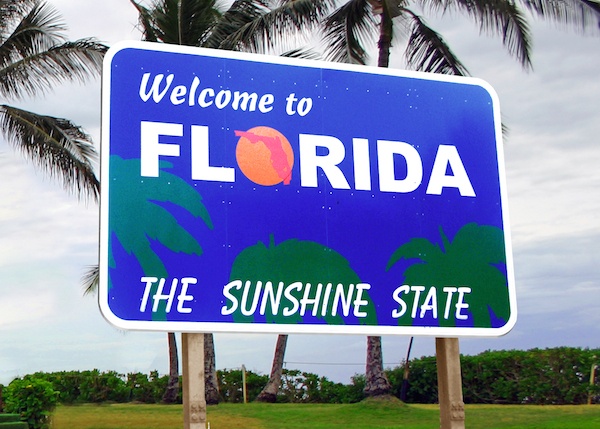

The Florida Bright Futures Scholarship programs are awesome education funding options for Florida state residents—if you can get through the application process, that is. The scholarships offered are particularly nitpicky and tedious about their eligibility requirements: the official handbook outlining these criteria is its own 14-page book chapter. (Luckily, we've created an overview for you in a different, much shorter post.)
Not to worry! We've outlined all the eligibility criteria for Florida Bright Futures Scholarships (general and specific, for each scholarship, with every single exception or special circumstance) in a way that’s a bit easier to get through.
We've also included information about when to expect notification about your eligibility. Once you’re considered eligible, you’re one (big) step closer to winning a Bright Futures Scholarship. After you’ve processed all this information, we'll get to the good stuff—how to increase your chances of winning your own Bright Futures award.

Before we dive into eligibility for Bright Futures Scholarships, let's first briefly go over what the scholarships themselves offer. There are three different scholarship programs, all with different eligibility requirements and award amounts.

There are a few different Bright Futures awards, but these blanket requirements apply to all of them (unless otherwise mentioned later on in the post). In order to qualify for one of these awards, you must:
If you meet all of the above requirements, you're on the right track to getting your own Florida Bright Futures awards.
The different Bright Futures scholarship awards have slightly different academic eligibility requirements. Use this info to determine which scholarship award might be the best match for you.
There are certain minimum requirements for high school coursework, GPA, ACT/SAT scores, and service hours that must be met to qualify for either of these programs. You'll have to meet the requirements in all of these domains in order to be eligible for an award. If you've won another academic award, you may have an easier time qualifying for an FAS or FMS award—we'll talk about why and how after discussing all academic requirements.
We'll start off with the easiest of the eligibility criteria—I've laid out here all the high school classes you need to have taken in order to qualify for an award. The good news is that most high schools require students to take these classes anyway, so barring any special circumstances, you should meet these requirements.
This chart outlines coursework requirements for both the FAS and FMS scholarships:
| High School Course | Credits Required | Comments |
| English | 4 | Three must include substantial writing |
| Mathematics | 4 | Must be at or above Algebra I level |
| Natural Science | 3 | Two must have substantial lab work |
| Social Science | 3 | — |
| World Language* | 2 | Must be sequential, and in the same language |
* A note about the World Language requirements: if you haven't taken the necessary courses, you can meet this requirement by demonstrating proficiency on credit-by-exam equivalencies or other "university-approved" means. What this means is if you can test out of your language in college, you’ll probably also meet this language requirement even if you didn’t take two sequential language courses in high school.
You'll need to demonstrate a degree of academic and community service excellence in order to qualify for either the FAS or FMS programs. You'll notice, though, that the FMS program is a bit less competitive in its minimum requirements. We've laid all of these eligibility criteria out in one chart per graduation year so you can easily compare requirements for both programs.
| SCHOLARSHIP | WEIGHTED GPA MINIMUM | ACT MINIMUM | SAT MINIMUM | SERVICE HOURS |
| FAS | 3.50 | 29 | 1330 | 100 hours |
| FMS | 3.00 | 25 | 1210 | 75 hours |
The good news is that the Bright Futures scholarship uses a superscore. Superscores take the highest section scores from each test you submit in order to create the highest possible cumulative score for one particular exam type. (Quick note: you can't combine a section score from the ACT and another section score from the SAT since they're not the same exam types. You can, however, combine scores from three or four different SAT
Let's take a closer look at superscoring. For example, Dominique has taken the SAT two times. Here are his scores from each test:
The Bright Futures scholarship uses a superscore, which is a combination of Dominique's two highest subject test scores (even though he took the test twice on two separate occasions). That means Dominique's superscore is the combination of 550 (Math) and 740 (EBRW), which gives him a cumulative superscore of 1290.
So in this case, a superscore is the difference between qualifying for an FMS scholarship and an FAS scholarship—which can save you thousands of dollars in college tuition!
A few other important notes:

Here are some alternative options for those who like to venture off the beaten path.
If you’ve received academic recognition through some other program, you may be eligible for the Florida Bright Futures Scholarship programs even if you don’t meet a few requirements.
This chart outlines the eligibility requirements for scholars who have been recognized by any of the programs listed below. If a box is blank, that means that you would be exempt from that particular requirement.
| Program | Florida Scholarship | ACT/SAT Score Minimums | Service Hours Minimums |
| National Merit/National Achievement Finalists and Scholars | FAS | -- | 100 hours |
| National Merit/National Achievement Finalists & Scholars | FMS | -- | 75 hours |
| National Hispanic Scholars | FAS | -- | 100 hours |
| National Hispanic Scholars | FMS | -- | 75 hours |
| AICE Diploma | FAS | -- | 100 hours |
| AICE Diploma | FMS | -- | 75 hours |
| IB Diploma | FAS | -- | 75 hours |
| AICE Curriculum | FAS | 29 or 1330 | 100 hours |
| AICE Curriculum | FMS | 25 or 1210 | 75 hours |
| IB Curriculum | FAS | 29 or 1330 | 100 hours |
| IB Curriculum | FMS | 25 or 1210 | 75 hours |
Also: keep in mind that if you're working toward an IB Diploma or an AICE Diploma, you have to have earned it prior to high school graduation for it to count. For more information, be sure to check out this chapter in the Florida Bright Futures Scholarship handbook.
The GSV program is a bit less competitive in terms of its academic eligibility requirements than the FAS or FMS programs. Although this makes it a great fit for some students, keep in mind that the GSV award can only be used to fund a career education or certificate program—no four year college degrees.
In order to qualify for the GSV program, you must meet all of the following criteria:
If you’ve taken both the SAT and the ACT, you unfortunately can’t mix and match section subscores between the two tests to meet minimums; you can, however, superscore across multiple test dates for the same test. (See the section above for more details.) All minimums must be met for either the SAT or ACT. but ultimately, you only have to take either the SAT or the ACT, not both!
This chart outlines GSV test score minimums:
| EXAM TYPE | SUBTEST | REQUIRED SCORE |
| ACT | Reading | 19 |
| English | 17 | |
| Mathematics | 19 | |
| SAT | Reading Test | 24 |
| Writing and Language Test | 25 | |
| Math Test | 24 | |
| P.E.R.T. | Reading | 106 |
| Writing | 103 | |
| Mathematics | 114 |
The Florida Gold Seal CAPE Scholars program, or GSC, is awarded to students who are enrolled in career education or career certificate programs that earn associates degrees and want to continue on to earn a Bachelor of Science degree. To qualify for the GSC, you must:
Students who meet these requirements can earn funding for a maximum of 60 credit hours put toward earning a Bachelors of Science degree or a Bachelors of Applied Science degree.


Feeling left out of all the scholarship fun? You could still be eligible!
As you can see, the eligibility requirements for the Florida Bright Futures awards are quite specific. Perhaps fortunately for you, there are just as many exceptions to these rules as there are actual rules. If you were homeschooled, have a GED, or live out of state, you still might qualify for the award even given the stringent criteria described above.
If you were homeschooled and don't have a Florida state standard diploma, you still may qualify for a Bright Futures award if you're registered with the district for the current and prior academic year and meet all the general requirements for Bright Futures. You can also qualify as a GED Diploma recipient (see below).
In order to qualify for a Bright Futures award as a GED student, you must meet the coursework requirements and GPA requirements outlined at the beginning of this post before taking the GED exam. The process of applying or qualifying for an award won't be much different than that of a student with a standard high school diploma. Just keep in mind that your eligibility for a scholarship will be determined in the academic year in which your GED is earned.
Be sure to check out the Florida Department of Education's website on the GED for more information about how this equivalency test works.
If you're a Florida resident but your parents live out of state, then you still qualify for the Bright Futures scholarship. This is true for renewal, too: if you're a Florida resident and your parents move out of state while you're in college in Florida, you still qualify for the scholarship.
Usually, only Florida residents can qualify for the Florida Bright Futures scholarships (not a huge surprise there). If you earned a high school diploma from a non-Florida school while living with a parent or guardian who was on military or public service assignment outside of Florida, you may still be eligible. Keep in mind, though, that this parent must be a Florida resident.
These eligibility qualifications above are tedious, to say the least. There are a couple of different official steps in place to determine program eligibility—these are implemented in order to make sure you’re checking off all the right boxes.
One option that the Bright Futures scholarship program offers is an early eligibility evaluation. If you submit transcripts and test scores to the Florida Department of Education early in your 7th semester of high school (halfway through your senior year), you’ll receive an "eligibility or ineligibility determination." These eligibility decisions should be posted to your online account starting in March. Although an ineligible determination is not ideal, it may save you a good chunk of time—you won’t have to submit a whole application for a scholarship program that you won’t be considered for.
If your final transcripts are submitted in your 8th semester or after you graduate high school, you’ll get an eligibility determination posted to your online account a little bit later. The scholarship program will begin posting these determinations in July.

Ready to get started?
Now that you know all about the Florida Bright Futures eligibility rules, you can start working on maximizing your chances of winning a scholarship. Many of the important eligibility requirements are long-term considerations, in the sense that you’ll have to plan out and work for the requirements starting your freshman year of high school. Here, I'll go through all the award criteria, giving tips and strategies to meet minimum coursework, GPA, test score, and service hour minimums.
Like I mentioned earlier, most high schools require students to take the courses necessary to qualify for the Bright Futures awards. If you’re worried you won’t meet the course requirements criteria, schedule a meeting with your guidance counselor ASAP to see if you can work in extra course credits before graduation.
GPA requirements are easier to meet when they’ve been maintained over several years. If you’re just missing the GPA cutoff requirements, you should consider:
Test scores might be a sticking point for many students. The ACT/SAT minimums for both the FMS and FAS scholarship are pretty high. Here's what you can do to increase your chances of meeting those minimum scores:
It would not be fun to try to fit in 75-100 service hours in the few months before high school graduation (remember that your service hours all have to be completed before you get your diploma). If you start volunteering as a freshman, you’ll only have to volunteer for an hour every 2-3 weeks in order to meet these minimums; if you start as a senior, however, you’ll have to volunteer 1.5-2 hours every week. So how do you stay on track?

Need more information on Bright Futures scholarships? Our guide to Bright Futures Scholarship programs answers all the questions you're wondering about.
Ready to get started on your Bright Futures application? Follow our step-by-step guide on Bright Futures applications for all the information you need to create a top-notch application.
Interested in more community service ideas? Check out our guide to 129 great community service projects. You may also be interested in other community service-based scholarships.